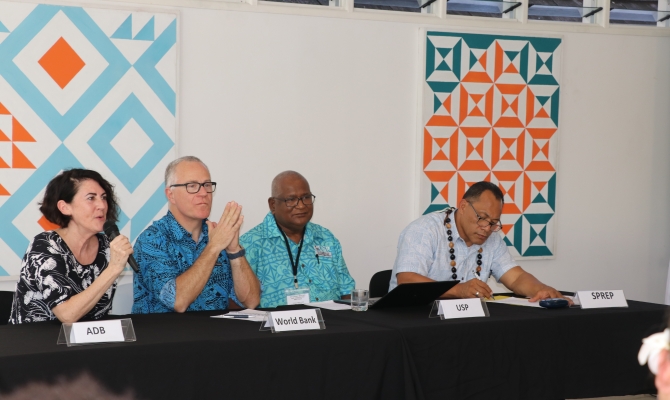
A partnership signed earlier this year will help Pacific islands gain greater access to technical environmental impact and assessment specialists and opportunities for training and capacity building, and will increase the development of regionally focused tertiary qualifications. Formally titled the Pacific Learning Partnership for Environmental and Social Sustainability (PLP-ESS), the partnership was featured during a side event at the 29th Meeting of Officials of the Secretariat of the Pacific Regional Environment Programme (SPREP) in Apia, Samoa.
Forming the panel at the side event were representatives from each organisation of the PLP-ESS – Asian Development Bank (ADB), University of the South Pacific (USP), World Bank (WBG), and SPREP.
Created out of a mutual interest in collaborating to foster training, knowledge exchange, technical expertise and capacity building related to environmental and social safeguards and standards in the Pacific region, the partnership seeks to respond to specific requests from Pacific Member countries to support their capacity building by providing logistical support to carry out trainings and mentoring of trainees, developing curricula, and providing trainers and assistance.
Dr. Morgan Wairiu, Acting Director of Pacific Centre for Environment and Sustainable Development at USP said, “The partnership will add value and strengthen the programmes of capacity building that USP currently offer. USP is currently taking steps to develop a new programme, the postgraduate diploma programme on Pacific Islands and Oceans Stewardship (PIOS).”
The programme will be offered in three streams —Conservation & Biodiversity Management for Islands and Oceans Stewardship (IOS), Research and Spatial Analysis for IOS, and Urban and Infrastructure Planning for IOS. It will be delivered under the PLP-ESS platform.
Senior Social Development Specialist of WBG Mr. Ross Butler said, “Relationships in the Pacific are fundamental to the success of programmes and this partnership was developed through relationships built over five years. This partnership aims to draw upon the strengths of each organisations, and to avoid the overlaps while filling in the gaps.”
One of the practical outcomes of the partnership is the WBG funded Environmental and Social Sustainability position at SPREP – an early building block of the partnership.
“The year-long position will also form a connection point between SPREP and the development banks and development partners to further help develop this partnership,” said Mr Butler.
Representing ADB, Ms Jean Williams, Senior Environmental Adviser Pacific Region stated that through the partnership, a collaboration to draft a Shared Approach to streamline bank policies which will strengthen country systems. The Shared Approach is a streamlined avenue for environmental and social sustainability which will align with country systems and is linked to SPREP’s Environmental Impact Assessment (EIA) Regional Guidelines where bank required elements will be included.
This infrastructure and groundwork of ADB and WBG, and the course work and tertiary qualifications provided by USP will link well with the work of SPREP in supporting Members countries in policy development. The value added by ADB, WBG and USP links to SPREPs strategic plan, and are crucial in the success of this partnership as each organisation provides key elements that complement each other.
“This partnership gives our Members greater access to a wide group of environmental impact and assessment technical specialists, training and capacity building opportunities, and the development of regionally focused tertiary qualifications,” said Mr Kosi Latu, Deputy Director of SPREP.
Mr Latu also stated that the partnership can also help to build the capacity of SPREP, with the end beneficiaries being SPREP’s Member countries who will gain greater coordinated support through the PLP-SES to achieve environmental and social safeguards and sustainability.
The PLP-ESS Principles of Collaboration was signed at the 19th International Association of Impact Assessment (IAIA19) held in Brisbane in April this year during the Pacific Day event, with founding partners the Asian Development Bank (ADB), the World Bank (WBG), SPREP and the University of the South Pacific (USP). The signing at IAIA19 was the culmination of five years of relationships between these organisations to form a partnership that aimed to draw upon the strengths of each partner.
The 29th SPREP Meeting of Officials is being held at the Tanoa Tusitala Hotel in Apia, Samoa from 3 - 6 September. The Meeting will bring together SPREP’s 21 Pacific island Members countries and five metropolitan Members to discuss strategic issues pertaining to the organisation, and to approve the 2020-2021 work plan. The Environment Ministers’ High-Level Talanoa will be held on Friday 6 September.
The 21 Pacific island member countries and territories of SPREP are: American Samoa, Commonwealth of the Northern Marianas, Cook Islands, Federated States of Micronesia, Fiji, French Polynesia, Guam, Kiribati, Marshall Islands, Nauru, New Caledonia, Niue, Palau, Papua New Guinea, Samoa, Solomon Islands, Tokelau, Tonga, Tuvalu, Vanuatu and Wallis and Futuna.
The five metropolitan members of SPREP are: Australia, France, New Zealand, United Kingdom and the United States of America.